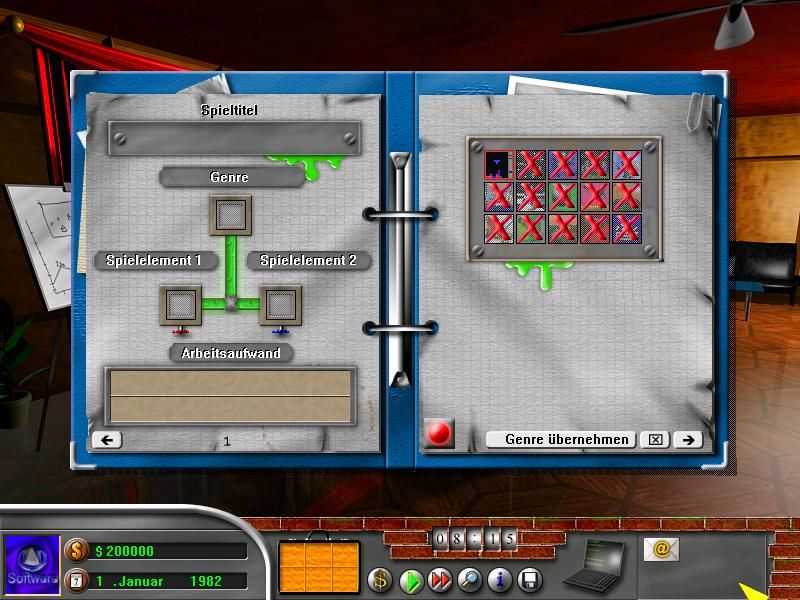Retro Replay Review
Gameplay
Software Tycoon: Der Spielemanager delivers a deeply engaging simulation of running a game development studio from the ground up. At the start of the nineteen-eighties, you’re given a modest capital base and tasked with handling everything from concept design to final sales. Every decision—from choosing game genres and bidding on movie licenses to assigning individual tasks to your programmers, artists, and sound designers—directly influences your studio’s success. This level of control creates a satisfying loop of planning, execution, and evaluation that keeps you invested for hours on end.
(HEY YOU!! We hope you enjoy! We try not to run ads. So basically, this is a very expensive hobby running this site. Please consider joining us for updates, forums, and more. Network w/ us to make some cash or friends while retro gaming, and you can win some free retro games for posting. Okay, carry on 👍)
The research system adds another strategic layer, allowing you to invest in technical advances such as moving from 4-color to 256-color graphics or unlocking new game genres. These upgrades not only diversify your portfolio but also help you stay competitive against rival studios. Balancing long-term research projects with the immediate demands of current game releases is a constant challenge, and learning to gauge risk versus reward becomes a core part of the experience.
Additionally, the scenario and free-play modes offer different objectives and pacing. Whether you’re chasing a “Game of the Year” award in a time-limited challenge or simply experimenting in open-ended mode, the game adapts to your chosen playstyle. The in-game magazine reviews and sales charts provide instant feedback on each release, making it easy to fine-tune your strategy for maximum profitability and reputation growth.
Graphics
While Software Tycoon embraces a retro aesthetic, the clarity and consistency of the interface are major highlights. The clean menus, iconography, and charts evoke the spirit of early ’80s PC software without feeling outdated. Each department—design, programming, art, marketing—has its own visually distinct panel, making it simple to track resource allocation at a glance.
The game’s art style may not rival modern 3D simulations, but its pixel-art charts and period-correct typography lend an authentic charm. Screens showing monthly sales, top-seller lists, and your internal R&D tree are crisply rendered, ensuring that data remains legible even during marathon play sessions. The modest animations, such as a printer spooling discs or a marketing billboard updating, add flavor without overwhelming the user experience.
Customization options for your game’s packaging and advertising posters allow for a dash of creativity. Though limited by the era’s technological constraints, choosing color schemes and promotional slogans gives you a small canvas to express your branding vision. Overall, the graphics serve the simulation’s needs perfectly, reinforcing the nostalgic atmosphere while keeping every stat and option front and center.
Story
Unlike narrative-driven titles, Software Tycoon unfolds its stories through emergent gameplay rather than scripted events. Each scenario crafts its own little drama: launching your first budget title under tight deadlines, outbidding competitors for a blockbuster movie license, or scrambling to complete a cutting-edge genre you just researched. These moments build a unique tale of uphill battles and triumphant successes.
In scenario mode, clear objectives provide narrative anchors. For example, you might be challenged to deliver a top-selling title on a shoestring budget, which forces creative compromises and quick pivots. Hitting milestones—like earning enough reputation to attract top talent or winning a fictional industry award—feels like chapters in your studio’s origin story.
Even in free-play, the ebb and flow of sales figures, magazine reviews, and R&D breakthroughs generate a personalized storyline. Watching a brainchild idea evolve from a simple four-color platformer into a genre-defining hit offers its own sense of dramatic progression. The story you tell is really the history of your studio, shaped by the strategic and creative choices you make along the way.
Overall Experience
Software Tycoon: Der Spielemanager strikes a rewarding balance between accessibility and depth. Newcomers to business simulations will appreciate the intuitive UI and helpful tutorial prompts, while veteran tycoons will find enough complexity in budgeting, staffing, and research to remain engaged. The game scales smoothly to different skill levels, ensuring that every player faces compelling challenges without feeling overwhelmed.
The soundtrack and sound effects—think nostalgic bleeps, whirs, and satisfying “cha-chings” when sales numbers skyrocket—reinforce the period setting and inject energy into each feedback loop. Combined with the crisp visuals, the audio design helps maintain a steady rhythm throughout the highs and lows of studio management. It’s a cohesive package that feels polished, even if it wears its retro inspiration on its sleeve.
Whether your goal is to relive the dawn of home computing or to master the intricacies of game-industry economics, Software Tycoon: Der Spielemanager offers an addictive simulation experience. Its blend of strategic planning, emergent storytelling, and authentic period charm makes it a standout choice for anyone curious about the inner workings of game development—past or present.
 Retro Replay Retro Replay gaming reviews, news, emulation, geek stuff and more!
Retro Replay Retro Replay gaming reviews, news, emulation, geek stuff and more!









Reviews
There are no reviews yet.